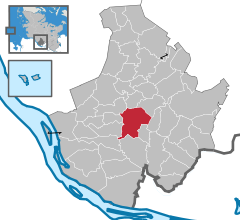Tornesch
| Tornesch | ||
|---|---|---|
|
||
| Coordinates: 53°42′N 9°43′E / 53.700°N 9.717°ECoordinates: 53°42′N 9°43′E / 53.700°N 9.717°E | ||
| Country | Germany | |
| State | Schleswig-Holstein | |
| District | Pinneberg | |
| Government | ||
| • Mayor | Roland Krügel | |
| Area | ||
| • Total | 20.62 km2 (7.96 sq mi) | |
| Elevation | 12 m (39 ft) | |
| Population (2015-12-31) | ||
| • Total | 12,946 | |
| • Density | 630/km2 (1,600/sq mi) | |
| Time zone | CET/CEST (UTC+1/+2) | |
| Postal codes | 25436 | |
| Dialling codes | 04122, 04120 | |
| Vehicle registration | PI | |
| Website | www.tornesch.de | |
Tornesch is a town in the district of Pinneberg, in Schleswig-Holstein, Germany. It is situated approximately 7 km (4 mi) southeast of Elmshorn, and 25 km (16 mi) northwest of Hamburg. Tornesch is also the home of the Klaus-Groth-Schule, named after the German poet Klaus Groth. It is also home to the Fritz-Reuter-Schule, named after German writer Fritz Reuter.
Tornesch has a place in biochemical history from the wood saccharification process developed by Scholler, also known at the Scholler-Tornesch process. The first factory to use the process was built in Tornesch. This early work was part of the development of biofuel such as cellulosic ethanol.
...
Wikipedia




